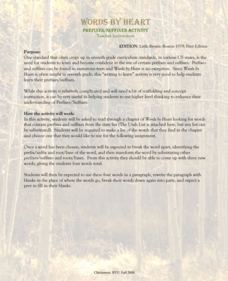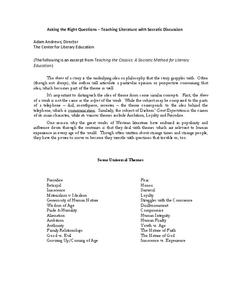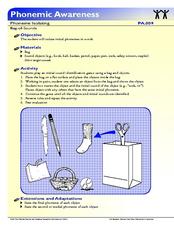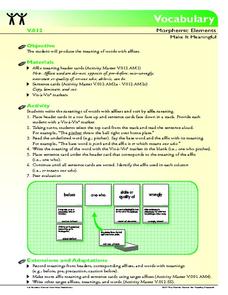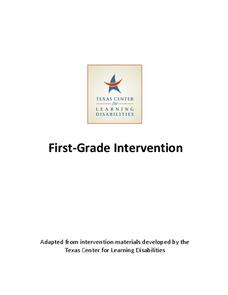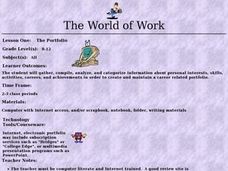Curated OER
Vocabulary Instructional Routine: Synonyms
Young scholars work with word cards to define and identify synonyms, antonyms, and homophones. Participants listen to instruction, read word cards, discuss their new-found knowledge, and put it into action by creating sentences and...
Teacher Web
Inferring Character Traits
Learning how to draw inferences from text is a key reading comprehension skill. Here's a worksheet that gives readers a chance to practice by offering 20 descriptive sentences and asking kids to identify the inferred character...
Novelinks
Words by Heart: Prefixes/Suffixes Activity
This lesson is so beneficial it makes any teacher's heart skip a beat! After readers identify words from Words by Heart, they break down unknown vocabulary with a handout detailing various prefixes and suffixes. Once they finish...
EngageNY
Researching: Asking the Right Questions
Learners look over the iCare about the iPhone performance task and discuss how it relates to working conditions. They then review the research process and place focus on the step of asking questions. Finally, scholars ask questions to...
Curated OER
The Art and Science of Impressionist Color
Discover Impressionist painting as learners investigate the 19th century combinations of colors characteristically used. Students experiment with their own paintings, utilizing primary and secondary colors.
Writing Educators Symposium
Asking the Right Questions
It can be difficult to find the theme of a book or story if you don't know the questions to ask. Teach your kids to discern the universal theme in works of literature with a set of activities that promote critical thinking and...
Florida Center for Reading Research
Phonological Awareness: Phoneme Isolating, Bag-of-Sounds
In pairs, pre-readers take turns holding up objects from a bag. As one child holds up an object, the other names it and says its initial letter sound. They work together to sort the objects into piles based on how they isolated and...
ReadWriteThink
Scaffolding Methods for Research Paper Writing
Rome wasn't built in a day, but researchers can be with proper scaffolding. This writing unit has scholars write a research paper through scaffolding of various parts of the process. Learners begin with identifying a topic and crafting a...
K12 Reader
Hide and Seek
After examining a brief article about survival adaptations, readers identify the main idea of the passage and list two supporting details.
ReadWriteThink
Critical Media Literacy: Commercial Advertising
Commercial advertising—we can't get away from it, but do we realize just how often we are being advertised to? With this instructional activity, scholars analyze mass media to identify how its techniques influence our daily lives....
Florida Center for Reading Research
Vocabulary: Morphemic Elements, Getting to the Root of It
Young readers learn how to get at the root of new vocabulary with this fun language arts activity. When working in pairs, children begin by matching unknown vocabulary words to their Greek or Latin roots. When all the vocabulary cards...
Florida Center for Reading Research
Vocabulary: Morphemic Elements, Make It Meaningful
Scholars learn to find meaning in words using affixes with a language arts activity. In pairs, children sort cards with printed sentences that include words with the prefixes mis- and pre- and the suffixes -er, -ness, and -able. Then,...
K12 Reader
Galileo and His Telescope
Readers are asked to identify how a key detail reveals the main idea of a paragraph about Galileo.
Curated OER
Hero or Tyrant: Connecting Beethoven’s Third Symphony to Napoleon, Part One
The second and third movements of the Eroica, Beethoven's Symphony No. 3, provides listeners with an opportunity to connect to French Revolution and to Napoleon Bonaparte. As they listen to the music, individuals draw what their ears...
Santa Monica-Malibu Unified School District
Parts of Speech Pre-Test: The Building Blocks of Grammar
Help your learners get a good grasp on grammar. An insightful pre-test allows teachers to learn about their young writers' knowledge of the building blocks of grammar, so they can begin building a unit of study. It includes a...
Houghton Mifflin Harcourt
One Land, Many Trails: Extra Support Lessons (Theme 5)
Grammar, vocabulary, and comprehension strategies are all part of the journey toward understanding a text. The last in a series of three extra support lessons designed to accompany Theme 5: One Land, Many Trails provides a wealth of...
Reed Novel Studies
Jacob Have I Loved: Novel Study
Twins always have double the fun, right? Sara, in Jacob Have I Loved, always is in the shadows of her twin sister. Scholars identify synonyms, answer comprehension questions, foreshadow, and create alliterations as they read about how...
August House
How Tiger Got His Stripes
How did the tiger get its stripes? Kindergartners read a Vietnamese folk tale, "How the Tiger Got His Stripes," retold by Rob Cleveland, and work through several reading comprehension and literary analysis activities.
Curated OER
The Goldilocks Rules for Choosing a Book That Is “Just Right”
With so many books to choose from, it can be hard for young readers to find the right one. Help children overcome this problem with this list of rules for identifying books that are too easy, too hard, and those that are just...
Poetry Class
Tackling Climate Change
Get your kids thinking about climate change with a series of activities that include creating a ditty box poem for the planet, a poem that identifies concepts or objects they would want to preserve.
Texas Center for Learning Disabilities
First-Grade Intervention
Learning how to read is a big challenge for young learners, but this series of lessons provides them with the extra support they need to succeed. With each lesson following the a clearly outlined format, children are introduced...
Texas Center for Learning Disabilities
Second-Grade Explicit Intervention
Unfortunately, not all students learn to read at the same pace, but with the help of this resource, you can ensure that they all receive the support they need to reach this important goal. Comprised of short...
Apple State University
Friendly Letter Mini-Lesson
This mini-lesson about informal letter writing is packed with a lot of information about writing a friendly letter. Class members begin by working in pairs to answer questions after reviewing letter models. Then, take part in a grand...
Curated OER
The World of Work: The Portfolio
Learners compile information to include in their career portfolio. In this portfolio lesson, students view example portfolios using the given website and identify the portfolio components. Learners gather and compile artifacts for their...




